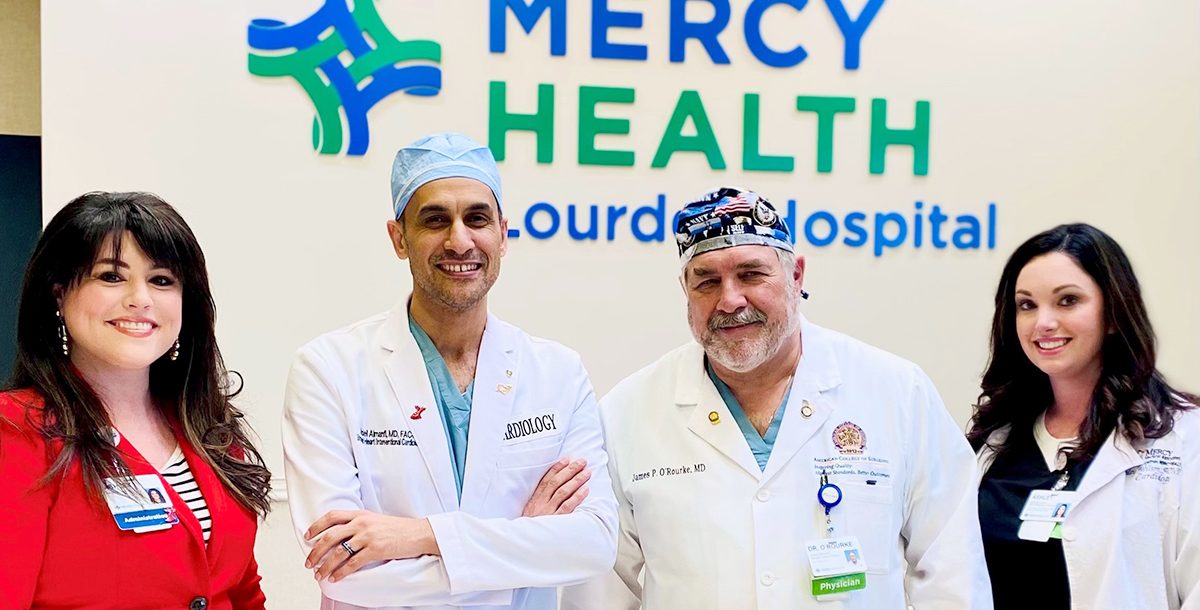Abdelkader Almanfi, MD, an interventional cardiologist, and James O’Rourke, MD, a cardiothoracic surgeon launched a transcatheter aortic valve replacement (TAVR) program at Mercy Health – Lourdes Hospital on September 16, 2020. Just over seven months later, the program has restored quality of life to more than 50 patients.
Lourdes Hospital’s TAVR team performed its 50th procedure on April 21 on patient Betty Fitts, 85, and she couldn’t be more pleased with the outcome.
“When I would walk to the mailbox, I would have to come in and sit down. I was really getting short-winded,” she says.
Just days after her procedure, however, Betty was able to enjoy a walk.
“I came back, sat on the porch and said, ‘I can breathe.’ It was amazing. I’m so glad I had the procedure.”
Like Betty, most TAVR patients require only an overnight stay in the hospital. This procedure offers a minimally invasive way for doctors to treat valve disease without open heart surgery.
The medical team inserts a catheter into one of the leg arteries, or, less typically, an artery located near the shoulder or the chest. The artery is a pathway to deliver the new valve, which is crimped. From there, the TAVR team advances the new valve through the catheter to the diseased valve and deploys it using x-rays and cardiac guided ultrasound. The new valve starts functioning immediately to help most patients experience instant clinical benefit.
Rose Logsdon, 84, had her TAVR procedure on March 17 of this year.
“I was pretty miserable. I had a lot of swelling and my legs hurt to the point where they burned constantly,” she recalls. “I had a hard time walking, a terrible time breathing and no energy whatsoever.”
Following her TAVR procedure, Rose, is a changed woman.
“I feel a lot better. In fact, I feel pretty doggone good,” she says. “My swelling is about 70% gone, my breathing is much better, I have a little bit more energy and I walk every day to try to add to it.
She adds, “if you need this procedure, I would say don’t hesitate and I would recommend Dr. Almanfi do it. He has an excellent personality. He explained it to where I didn’t have to ask a lot of questions and the questions I asked, he answered to where I could understand him.”
Clinton Sheridan, 78, echoes the experiences of Betty and Rose.
“For four to six months before my procedure, I had gotten to where I was just really short of breath before I did any exertion. If I walked to the mailbox, I was totally exhausted. If I took the garbage out, it wore me out. I couldn’t do much of anything,” he says.
After blacking out and being transported to Lourdes Hospital, Clinton found himself talking with Dr. Almanfi.
“He ran some tests and told me it was time for a valve replacement. I was ready to do something. When he said Dr. O’Rourke would be working on me, too, I was really happy because he did my open-heart surgery when I had three blockages.”
The difference between TAVR and open-heart surgery is profound.
“With TAVR, I had a one-night stay. With open heart, it was probably three to four days and a lot of pain,” he says.
Overall, Clinton is pleased with his TAVR results.
“I’m 78 years old. I know I’m not like when I was 50, but it helped me tremendously. My wife said, ‘I got my helper back now.’ I recommend it for anyone who is in the condition I was in.”
Lauren Coplen, 68, is another satisfied patient.
“Before TAVR, I was extremely tired, more tired than I should have been. If I got up to do something, it wouldn’t take much for me to get out of breath. There near the end, I was dragging,” she says.
She had her TAVR procedure on March 10.
“I feel good again,” Lauren shares. “I’m very pleased that a less invasive procedure was an option. It means a lot less recovery time. It’s just amazing that they can do this now and Dr. Almanfi gets a gold star. His bedside manner is excellent. Between him and Dr. O’Rourke, I’m very satisfied.”
Patients suffering from any valvular disease may be TAVR candidates. The procedure takes less than 60 minutes with patients typically under twilight sedation in the cardiac cath lab.
TAVR carries a very low risk of complications and patients are generally ready for discharge within 24 hours, with complete recovery in less than a week.
Learn more about the TAVR procedure as well as the other heart and vascular services we offer at Mercy Health.






